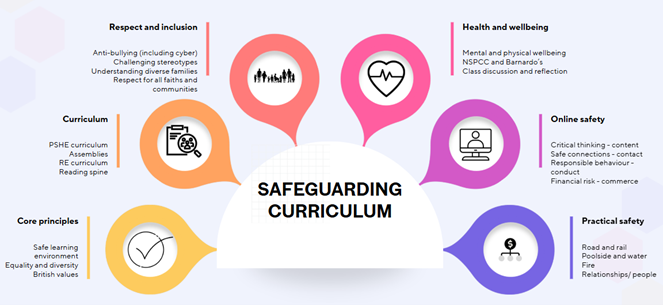Safeguarding Curriculum
Crofty recognise that our safeguarding duties in schools extend beyond our child protection procedure to proactively keeping children safe. A key aspect of this is our safeguarding curriculum. In Crofty schools this includes not only a broad and balanced curriculum which enables pupils to learn about diversity and acquire the knowledge, understanding and skills that positively impact personal development, behaviour and welfare. Our curriculum aims to equip every school with the knowledge, skills and understanding required for personal safeguarding.
We challenge children to think deeply about safeguarding matters and their own personal physical and mental wellbeing. We value pupils’ questions and give them space for their own thoughts, ideas, and concerns. We give pupils’ opportunities across the curriculum to explore values, personal rights, responsibilities, and equal opportunities that develop moral concepts that impact positively on safeguarding, promote British values and prevent radicalisation and extremism. There are many opportunities throughout our learning in school to explore safeguarding issues.
Practical safeguarding opportunities are planned into the curriculum. For example:
- Road and rail safety (including out of school visits, bike-ability, work with police officers in the community)
- Poolside and water safety through swimming lessons
- Fire awareness (including visits from the local fire service)
- Visits to school from medical staff
- Visitors from charities such as NSPCC
- Online safety quizzes and training
- Our visits and experiences incorporate “Stranger Danger”, being safe in the outdoors, what to do if??
- What to do if you are separated from your group (in relation to school visits)
- Safe use of technology including password security and privacy settings
We have developed an open and safe learning environment in which pupils express their views, seek help, and help others. The promotion of equality of opportunity and diversity, for pupils and staff, helps prevent any form of direct or indirect discriminatory behaviour.
Our children learn to not tolerate any prejudiced behaviour. Our behaviour policy promotes making good choices and exhibiting good learning behaviours. Our class sessions are a time for sharing ideas, addressing concerns, reflecting on our attributes and promoting important values.
Assembly time, PSHE lessons and class discussions are used to promote personal safeguarding matters and explore themes. For example, we talk about anti- bullying including cyber bullying and British values including how these values are promoted in our multi–faith society. Staff and children are quick to challenge stereotypes and the use of derogatory language in lessons and around the school. Our school reflects the diversity of pupils’ experiences and provides pupils with a comprehensive understanding of people and communities beyond their immediate experience including the role of women in society and different family groups including same-sex couples.
Throughout the curriculum, there are planned opportunities to promote all forms of equality and foster greater understanding of and respect for people of all faiths (and those with no faith), races, genders, ages, disabilities, and sexual orientations, through their words, actions and in their influence. Opportunities are created in a variety of subjects to address areas of safeguarding, for example, themes are highlighted through novels in English lessons.
Time is taken at the beginning of every new school year to reaffirm school values, expectations, and rules for being part of our school. This good start to the year, with everyone clear about their roles and responsibilities, sets the tone for the rest of the year and leads to excellent safeguarding outcomes.

